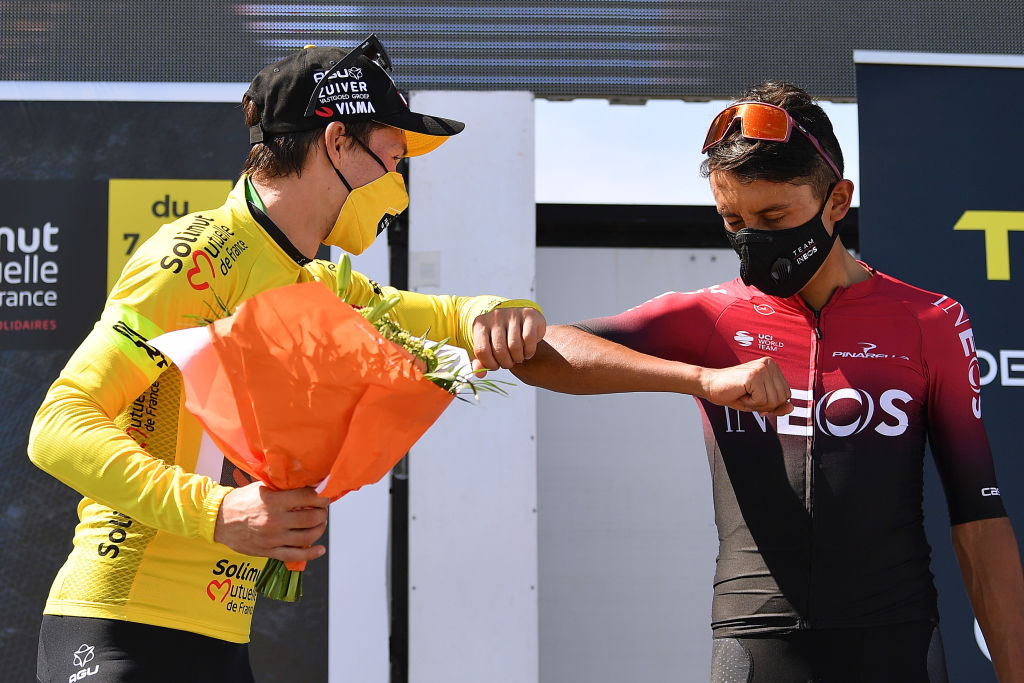UCI recommends strict measures in third season of COVID-19 pandemic
Belgian teams prepared, Van Avermaet: I'm not some kind of Djokovic

With the start of the 2022 racing season getting underway in days the UCI is preparing to impose strict rules to mitigate COVID-19 risks. Hopes of a more 'normal' season with the advent of effective vaccinations came crashing down amid exponential increases in cases across Europe brought on by the more infectious Omicron variant.
The UCI updated previous rules imposed before the widespread availability of vaccines, and, as long as infection rates remain high, expect to see riders separated on podiums, wearing masks and putting on their own leader's jerseys.
The measures will apply to most UCI-sanctioned road competitions and, where local restrictions are in place, the more stringent of the two will apply.
That means riders have to abide by measures passed by the French parliament on Monday which requires them to be vaccinated for races in that country. The season opens there with Grand Prix Cycliste de Marseille La Marseillaise on January 30.
Other early-season races are also affected by local ordinances - only vaccinated visitors can attend the Saudi Tour from February 1-5, and the UAE is requiring visitors to have both vaccination and recent booster shots. That race takes place from February 20-26.
The UCI rules reactivate all of the 'non-pharmaceutical' measures against COVID-19 that were put into place in 2020: wearing masks, sanitizing facilities, requiring PCR tests and more because of the more infectious Omicron variant causing the latest surge in cases.
The federation will roll out a 'UCI Health Pass' and hope to convince teams with low vaccination rates to get everyone immunized. According to a December UCI presentation, 97 per cent of members of Women's WorldTeams, 86 per cent of ProTeam members and 79 per cent of WorldTeam members have been vaccinated.
Get The Leadout Newsletter
The latest race content, interviews, features, reviews and expert buying guides, direct to your inbox!
A rider would earn a Health Pass within a week to four weeks of a full course of vaccination with any of the shots authorised in Europe: Pfizer's Comirnaty, Moderna's Spikevax, the Johnson & Johnson/Janssen, AstraZeneca Vaxseveria or Novovax Nuvaxovid vaccines, or a week after a PCR-confirmed COVID-19 infection.
The rules do not absolutely require people to be vaccinated: a Health Pass can be granted with proof of a negative PCR test within 48 hours of attendance at a race, but has to be repeated every 10 days. For Grand Tours, negative test results must be presented before arrival regardless of vaccination status, and COVID-19 screening will continue to take place on rest days.
Luckily for the riders, the UCI suggests that sample collection via saliva is acceptable so that means no more swabs up the nose.
Fines for not following the rules range from 1,000 to CHF 10,000.
Belgian teams are ready
According to Het Laatste Nieuws, the Belgian riders and teams are prepared for the requirements. Jumbo-Visma spokesperson Ard Bierens told the outlet that everyone planning to attend the French races has already met the requirements.
QuickStep-AlphaVinyl team doctor Toon Cruyt said the team has "rushed over the past few months and have vaccinated all the riders and staff for the Classics campaign a second time."
The Classics riders on QuickStep, he said, will not get their booster shots until after that block of races.
Greg Van Avermaet, who reportedly will also wait until after the Classics to get his booster shot clarified that he had COVID-19 in November and had both shots the previous May.
"Had I not become ill, I would have already taken my booster," the AG2R-Citroën rider said. "I'm definitely in favour of vaccination, I wouldn't want anyone to think I'm some kind of Djokovic," he said referring to pro tennis player Novak Djokovic who was deported from Australia for violating entry rules that require proof of vaccination or natural immunity.
Although vaccination rates are good in most teams, the UCI presentation said that there is high variability among the teams. In a survey of teams taken between October and November 2021, some had vaccination rates as low as 40 per cent.
However, most of the teams should meet the requirements: three-quarters of the teams have more than 80 per cent of their members vaccinated.

Laura Weislo has been with Cyclingnews since 2006 after making a switch from a career in science. As Managing Editor, she coordinates coverage for North American events and global news. As former elite-level road racer who dabbled in cyclo-cross and track, Laura has a passion for all three disciplines. When not working she likes to go camping and explore lesser traveled roads, paths and gravel tracks. Laura specialises in covering doping, anti-doping, UCI governance and performing data analysis.